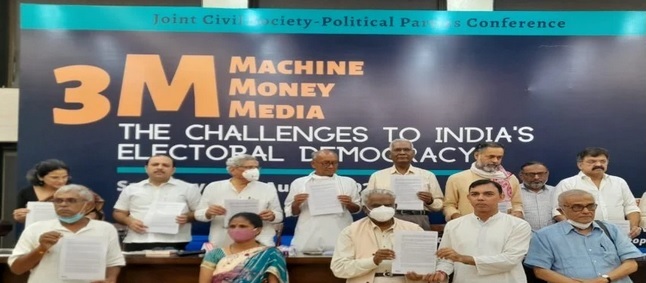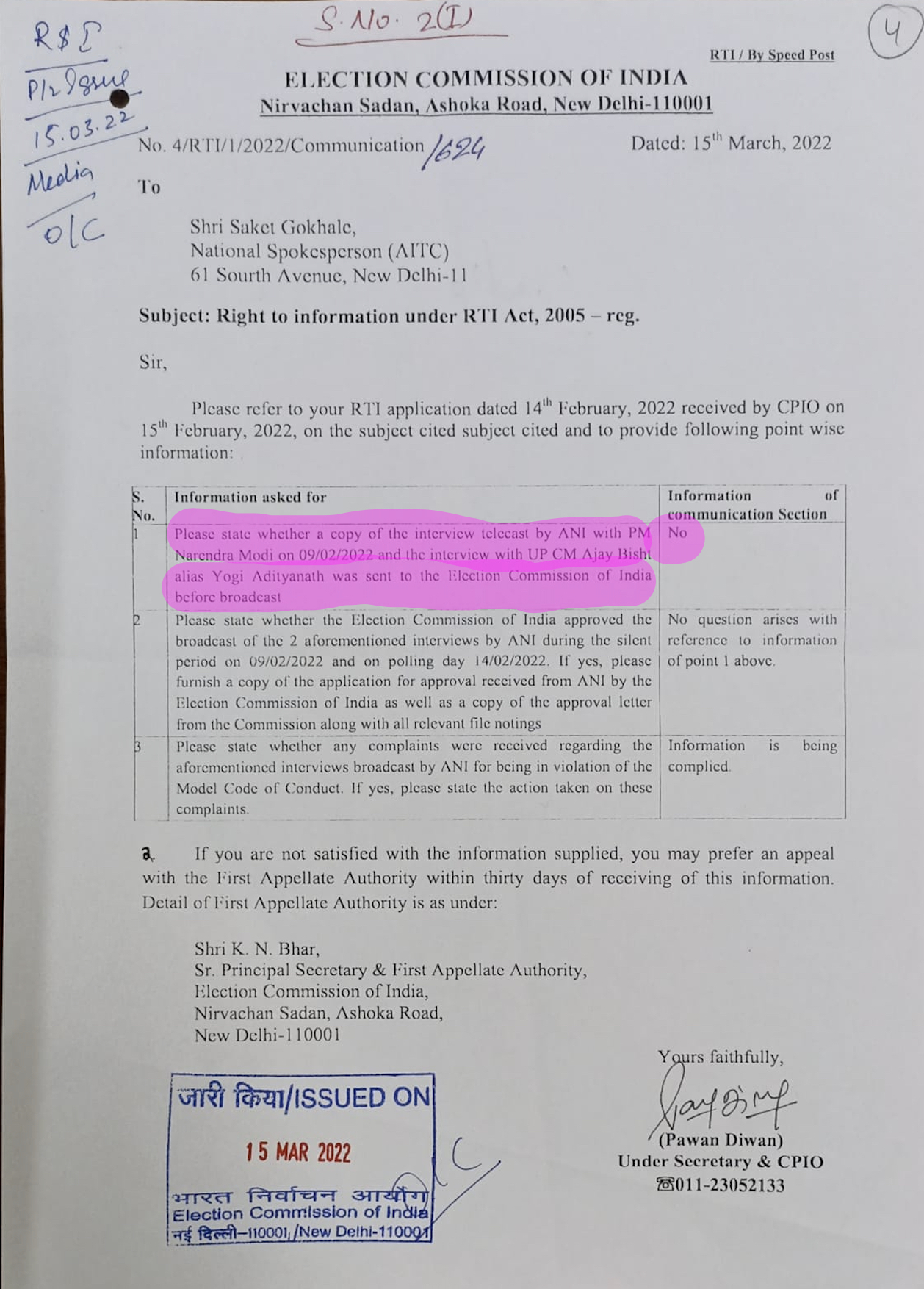The Electoral System
Joint Civil Society - Political Parties conference on 3M -Machine, Money, Media-Challenges to India's Electoral Democracy..
Press Coverage compiled by MGD
3 resolutions to fight against 'misuse' of EVMs, money power and media by Centre https://www.timesnownews.com/india/congress-10-other-opposition-parties-pass-3-resolutions-to-fight-against-misuse-of-evms-money-power-and-media-by-centre-article-93546477
सुप्रीम कोर्ट और ECI के पास प्रतिनिधि करेंगे पेश https://www.patrika.com/new-delhi-news/resolution-on-evm-and-vvpat-made-in-a-conference-by-civil-organisation-7709886/
Opposition push for fair polls https://www.telegraphindia.com/india/opposition-push-for-fair-polls/cid/1880023
11 Opposition Parties Resolve to Fight Against 'Misuse' of EVMs, Money Power and Media https://www.news18.com/news/politics/11-opposition-parties-resolve-to-fight-against-misuse-of-evms-money-power-and-media-5748499.html
https://www.deccanherald.com/national/national-politics/11-opposition-parties-resolve-to-fight-against-misuse-of-evms-money-power-and-media-1135930.html
https://www.latestly.com/agency-news/india-news-11-opposition-parties-resolve-to-fight-against-misuse-of-evms-money-power-and-media-4078489.html
https://www.business-standard.com/article/politics/11-oppn-parties-resolve-to-fight-against-misuse-of-evms-money-media-122081301031_1.html
https://www.ndtv.com/india-news/will-fight-against-electronic-voting-machine-evm-misuse-say-11-opposition-parties-3252460
https://theprint.in/india/11-opposition-parties-resolve-to-fight-against-misuse-of-evms-money-power-and-media/1081669/
https://www.nationalheraldindia.com/national/11-opposition-parties-resolve-to-fight-against-misuse-of-evms-money-power-and-media
https://english.varthabharati.in/india/11-opposition-parties-resolve-to-fight-against-misuse-of-evms-money-power-and-media
https://newz4u.site/india/will-struggle-in-opposition-to-digital-voting-machine-evm-misuse-say-11-opposition-events/
https://www.outlookindia.com/national/opposition-resolves-to-fight-against-misuse-of-evms-and-media-news-216252
https://www.amarujala.com/india-news/eleven-opposition-parties-resolve-to-fight-against-misuse-of-evms-money-power-and-media
https://youtu.be/2zgrA9spfQo (telugu)
https://www.hindustantimes.com/india-news/11-opposition-parties-resolve-to-fight-against-misuse-of-evms-money-power-and-media-101660414745490.html
https://navbharattimes.indiatimes.com/india/11-opposition-parties-resolve-to-fight-against-misuse-of-evm-money-power-and-media/articleshow/93546858.cms
Full text of press release..
Eknath Shinde Group Has Voluntarily Given Up Shiv Sena Membership Through Their Acts : PDT Achary https://www.youtube.com/watch?v=nvOanhGEscw
PDT Achary, former Secretary General of Lok Sabha, discusses anti-defection law and disqualification proceedings under the 10th Schedule of the Constitution in the context of political developments in Maharashtra in this interview with Manu Sebastian, Managing Editor of LiveLaw
Time Is Ripe to Rewrite Parts of Anti-Defection Law Which Politicians Habitually Misuse https://thewire.in/law/maharashtra-defection-law-shiv-sena Badly written, wrongly interpreted and obfuscatory at best, Para 4 of the 10th Schedule offers an opportunity to lawmakers to violate the very law it is a part of.
One, his original political party should merge with the other party.
Two, two-thirds of the legislators should agree to the merger.
However, recently, the Goa bench of the Bombay high court held in a defection case involving Goa assembly’s Congress members that if two-thirds of the legislators merge with another party this is a merger in law and the merger of the original political party is not an essential requirement.
Any citizen can move a petition for the disqualification of these MLAs if there is no merger under Paragraph 4 of the schedule.
The Election Commission of India has declined to be the part of the expert body proposed to be constituted by the Supreme Court to examine the issues relating to the promise of "freebies" by political parties during elections.
in its affidavit, the EC states " it may not be appropriate for the Commission, being the Constitutional Authority to offer to be part of the Expert Committee especially if there are Ministries or Government Bodies in the expert body. "
On July 26, the Court had termed freebies a "serious issue" and asked the Central Government to take a clear stand on the issue. The Court had also expressed reservations with respect to the ECI stand that offering freebies is a policy decision of a party and that the Commission cannot regulate state policies and decisions which may be taken by the winning party when they form the government.
In the supplementary affidavit filed by Mr Vijay Kumar Pandey, Director, Election Commission of India, "The oral observations made by this Court against the Election Commission during the previous hearing in the matter and which dame to be widely reported in the media has caused irreparable damage to the reputation of this institution build over the years. The reputational damage of this magnitude does not augur well for the country which is relatively younger but the largest and stable democracy in the world," the affidavit stated.
SC forming panel to examine issue of freebies by political parties is ‘burial by committee’: Experts Ashlin Mathew 04 Aug 2022,
https://www.nationalheraldindia.com/india/sc-forming-panel-to-examine-issue-of-freebies-by-political-parties-is-burial-by-committee-experts “The question before SC and committee is, what will be the effect of these freebies on elections. How is the committee going to answer that question?” senior counsel Rajeev Dhavan wonderedMost senior law experts and advocates believe that the Supreme Court’s decision to form a committee to look into the issue of freebies by political parties is, in effect, ‘burial by committee’...
Indian Civil Liberties Union (ICLU) founder and Supreme Court lawyer Anas Tanwir asserted that if the Supreme Court is concerned with electoral reforms, the first step would be to take up the Electoral Bonds case pending before it since 2019.
“The issue of Electoral Bonds affects free and fair elections far more than freebies can ever do.
Comment on whatapps: Bhaskar It is fair to be suspicious of a government that is suspicious of its people. The issue here is if it is election freebie, or governance freebie. Election freebie should be stopped. If governance freebie is stopped, why do we need governance? To say that one should not announce election freebies is to curb freedom of speech. To say that these freebies should not be delivered after is to curb freedom of action. To form an organisation of taxpayers to decide... but how? Poll everytime? So all taxpayers will be everyday voters? And rig elections everyday instead of once in 5 years?
https://twitter.com/SaketGokhale/status/1540168859147472898?t=D4vqkvmyI77owbVg7KsBGg&s=08

How Election Commission helped BJP in UP Elections. On 9th & 14th Feb (voting day), @ANI
telecast interviews with PM Modi & Yogi Adityanath. Voting day is meant to be silent period. After 4 months, ECI tells me that permission was NOT given for the interview (1/3)
Voting for UP Elections was in 7 phases. The interviews with Modi & Yogi Adityanath were telecast by @ANI
on 1st day of voting. Clearly, the idea was to influence voters for BJP. Shockingly, ECI tells me that complaints regarding this are "still being compiled."
I'd complained to ECI in Feb itself that these interviews are illegal under Representation of People Act, 1951 & are an attempt to influence voters. ECI took NO ACTION. Now it admits permission wasn't taken & is "compiling complaints". 
· 24 Jun 2022
PS: Funnily, the reply is dated 15th March but I was sent a copy only yesterday i.e. on 24th June. Why? To create an inordinate delay so that the matter can safely be buried.
@ajay5555522 24 Jun
institutions NO MORE are accountable to ANYONE. law&order is BIGGEST casualty in this type of set up
#WeWantTransparency @imk_twit 24 Jun
Can court dismiss or disolve EC for involvement in diluting the democracy rules and principles? ... Only if there does exist a honest bench to deliver justice and take care of Indian constitution! They have made a mockery of it themselves..
Debunking a 'Sealed' Myth: Only 17 Political Parties Of 105 In EC List Got Electoral Bonds https://article-14.com/post/debunking-a-sealed-myth-only-17-political-parties-of-105-in-ec-list-got-electoral-bonds-629d7a3bd1d5a
SHREEGIREESH JALIHAL, POONAM AGARWAL & SOMESH JHA 06 Jun 2022
Secretive political funding by companies and individuals through electoral bonds reached no more than 19 political parties of over 2,800 across India, with India’s ruling Bharatiya Janata Party (BJP) alone raising 68% of the Rs 6,201 crore received in three years, reveals a series of interviews and analysis of annual audit reports by The Reporters’ Collective.
The findings run contrary to the widely held belief (here and here) that electoral bonds were encashed by 105 political parties and the BJP’s claim that bonds are an efficient way to allow, in the BJP’s words, “donation to any political party of donors’ choice”.
In 2017 and 2018, petitions were filed (here and here) in the Supreme Court challenging the legality of electoral bonds through which corporate companies and individuals anonymously donated unknown amounts to political parties, with no limits. The Supreme Court on 12 April 2019 asked the Election Commission (EC) to find out and provide information on which parties received electoral bonds worth how much.
